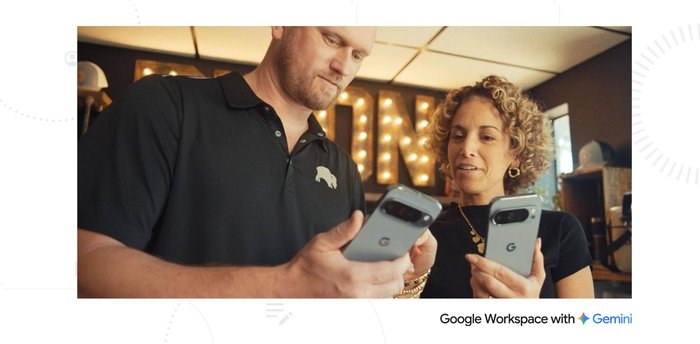Cybersecurity with a pulse: How Trellix keeps internal operations safe with Google Workspace

The Google Workspace Team
Google Workspace Newsletter
Keep up with the evolving future of work and collaboration with insights, trends, and product news.
SIGN UP

“Migrating to Workspace made my job as CIO a lot more fun because it’s now about creating experiences for employees, not just implementing IT.” — Kim Anstett, CIO, Trellix
Snapshot: Cybersecurity company Trellix is building the future of extended detection and response (XDR) technology. Discover why its migration to Google Workspace aligns with its cybersecurity ethos. Read on to learn:
How Trellix made its employee experience more engaging and secure
Why embracing an innovation mindset is critical for all security teams
How Trellix is experimenting with Gemini for Workspace to deliver more “a-ha!” moments for employees
The mission and challenge
What if cybersecurity had a pulse, and was constantly watching, learning, and adapting?
For Trellix, it does. With more than 40,000 customers and millions of endpoints, the cybersecurity company leans on its widespread, continuous stream of data to learn and improve its cybersecurity intelligence. Its security operations center (SOC) ingests and integrates information from a multitude of sources to continually make sense of the bigger picture within the realm of cyber threats. This approach extends to the technologies the company uses for day-to-day communication and collaboration.
“Our previous software stack felt stagnant. It was never going to connect into new things we were doing or building,” says Trellix CIO Kim Anstett. “I expected Google Workspace to be the right and easiest solution, and it was. The platform is constantly evolving, updating its integrated components, and embedding automation across its stack. Migrating to Workspace made my job as CIO a lot more fun because it’s now about creating experiences for employees, not just implementing IT.”
The switch to Workspace
As Trellix grew, it started to face challenges in the places where communication, information technology, and security intersect. For a while, business units solved isolated issues by buying new software solutions. But as Anstett explains, “That rip-and-replace approach is a scary thing for security.” Workspace offered a central, secure way to unite Trellix’s global teams and enable smoother user experiences.
Following the migration, Trellix adopted the zero-trust capabilities built into Workspace and augmented them with its own security solutions, such as security operations console, email security, and endpoint protection. While security precautions used to be seen at Trellix as an obstacle to the user experience, they now go hand-in-hand with seamless employee collaboration, thanks to Workspace.
For example, Trellix employees can chat, email, view files, edit documents, and join meetings from their device of choice without worrying about security and access permissions. All these capabilities live within the same platform, making it easier and simpler for security admins to oversee data safety with features like endpoint management and zero trust access controls in Workspace — without slowing down employee collaboration
“Our previous siloed solutions made it hard to control where data was sitting and who was accessing it,” explains Anstett, “so we had to lock down harder on each device to prevent information from crossing unwanted boundaries. Using Workspace end-to-end has reduced complexity around admin controls while making things easier and more enjoyable for employees across the devices of their choice.”
Meanwhile, Trellix is experimenting with Gemini for Workspace to further simplify and streamline operations. For example, by helping team members prioritize actionable items from meeting notes and reports. “It’s similar to what we’re doing at Trellix from a cybersecurity standpoint,” Anstett says. “Our exhausted SOC team members used to go through 16,000 risk alerts to identify critical issues. Now, we use AI to break that down into a handful of items that we need to prioritize. So using generative AI within Workspace enables employees to apply that same line of thinking and be prompted in that same efficient way across their day-to-day operations, which is brilliant. They wouldn’t have as many ‘a-ha!’ moments if they were still using our old tools, stuck in our old ways.”
Looking ahead
As a further step against insider threats and data leaks, Trellix collaborated with Google Chrome Enterprise to launch an integrated browsing protection feature earlier in 2024. Its goal is to further enhance the security of enterprise web browsing to protect more organizations’ sensitive and proprietary information from internal compromise. Users don’t have to set up or configure rules themselves to secure their browsers—the Trellix Data Loss Prevention (DLP) solution handles it automatically, removing complexity and making for a frictionless user experience.
This culture of innovation and collaboration will continue to steer Trellix’s journey. Anstett explains that cybersecurity threats will always evolve—as will the company and its way of working. Trellix sees cybersecurity technology as a living, breathing thing that’s always changing—and Workspace will be a long-term enabler for that continuum of change. “Workspace is always listening to its users, coming up with innovations, and evolving its features, which creates a culture of openness to working differently,” Anstett says. “We need team members who are not just willing to continually evolve, want to do more, and do it better, but who also have the right tools to react to change.”



